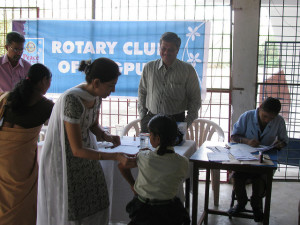
German measles (rubella) vaccination, Nagpur, India
Last Tuesday, MomsRising.org held a conference call featuring U.S. Surgeon General Vivek Murthy, who spoke about measles vaccines. The call also featured Dr. Bruce Gellen, who is Deputy Assistant Secretary for Health at the U.S. Department of Health and Human Services, and Dr. Amanda Cohen of the U.S. Centers for Disease Control.
MomsRising.org focuses on children’s and family health issues, including working for common-sense gun safety laws. Thus, the group formed a natural pairing with Gen. Murthy, whose nomination for Surgeon General was delayed for more than a year by pressure from the National Rifle Association, after Murthy stated that “guns are a health care issue.” Indeed, it took an ebola outbreak and the beginning of a measles outbreak traced to Disneyland in California to focus attention on the contradiction between Republican fear-mongering and the lack of a U.S. Surgeon General. The U.S. Senate finally confirmed Murthy, along with other Executive Branch nominees last December, during the lame duck session of Congress, and only as a result of the Democrats having changed Senate rules in November 2013 to prevent filibustering Executive Branch nominees.
Murthy, who is only 37 years old, was very calm and patient on the conference call, especially given that some of the participants expressed fears about vaccinating their children for measles, including the debunked yet persistent rumor that measles causes autism. Murthy explained that there was no scientific evidence linking measles to autism, and that the so-called study that started this rumor was later retracted as fraudulent.
Instead, Murthy touted the great benefits of vaccines, including the MMR (measles mumps rubella) vaccine at issue here. Murthy said that the measles vaccine is not experimental, and that we now have over 50 years of data and results proving its effectiveness. According to Murthy, the measles vaccine has saved over 50 million lives. Murthy said that measles is one of the most contagious airborne diseases, such that, if you are in the same room with someone who has measles and you have not been vaccinated, you have a 90 percent chance of getting infected.
Before the measles vaccine was used in the 1950s, according to Gen. Murthy, millions of children got the measles, thousands were hospitalized, and hundreds died each year. Indeed, said Murthy, millions of people around the world still get measles, and that measles can cause deafness, pneumonia and encephalitis (brain inflammation), and requires hospitalization in one-fourth of cases.
Murthy concluded that the benefits of the measles vaccine far outweigh any risks for individuals. Murthy added that, when individuals don’t get vaccinated, that increases risks to others. According to Murthy, the U.S. measles vaccination rate is 92 percent, but that it is lower (sometimes much lower) in some communities. Murthy noted that some people, especially those with immune deficiencies and other medical conditions, cannot get vaccinated. Moreover, babies are not vaccinated until approximately 12 months of age. Therefore, said Murthy, we risk harming these people if we do not get ourselves and our children vaccinated.
Murthy advised parents to check credible sources of information (the conference call itself being one such source), and then to share their information with their friends and family members who may have concerns about vaccines. Murthy said that parents can check the vaccination rate in their schools, and they can get involved with eduction efforts to raise the rate if it is too low. According to Murthy, “none of us are islands” and we should all do our part in our communities to keep our own children and each others’ children safe.
Photo by Rotary Club of Nagpur, used under Creative Commons license. http://is.gd/bSYZzX


